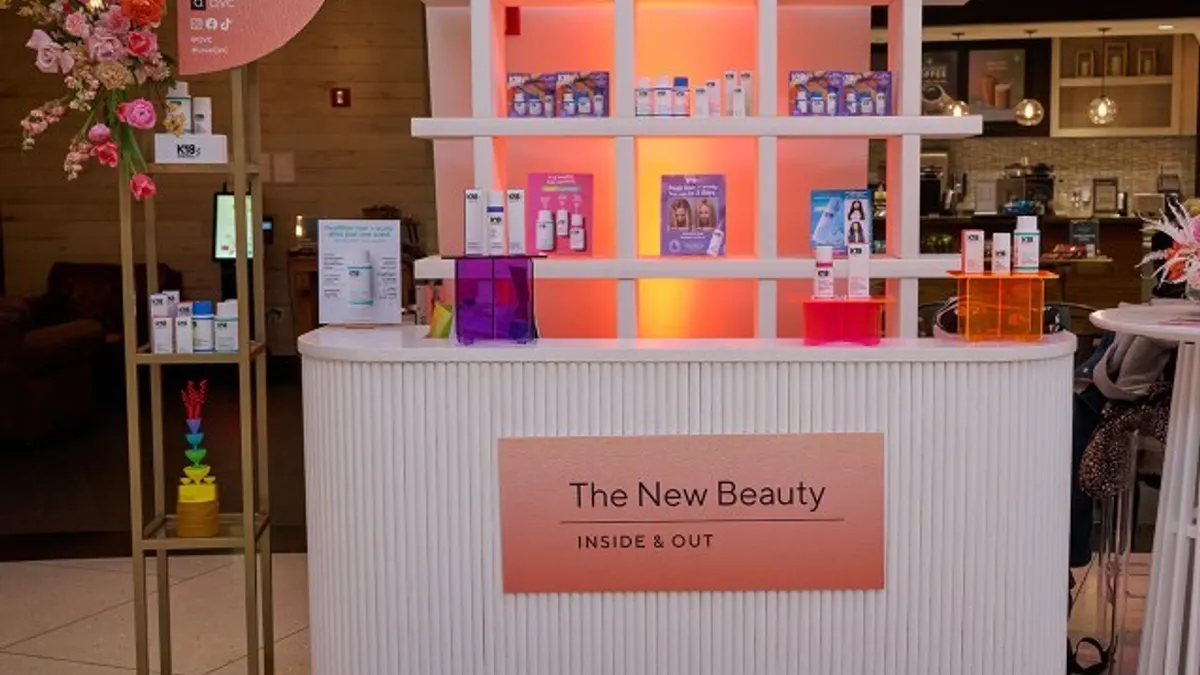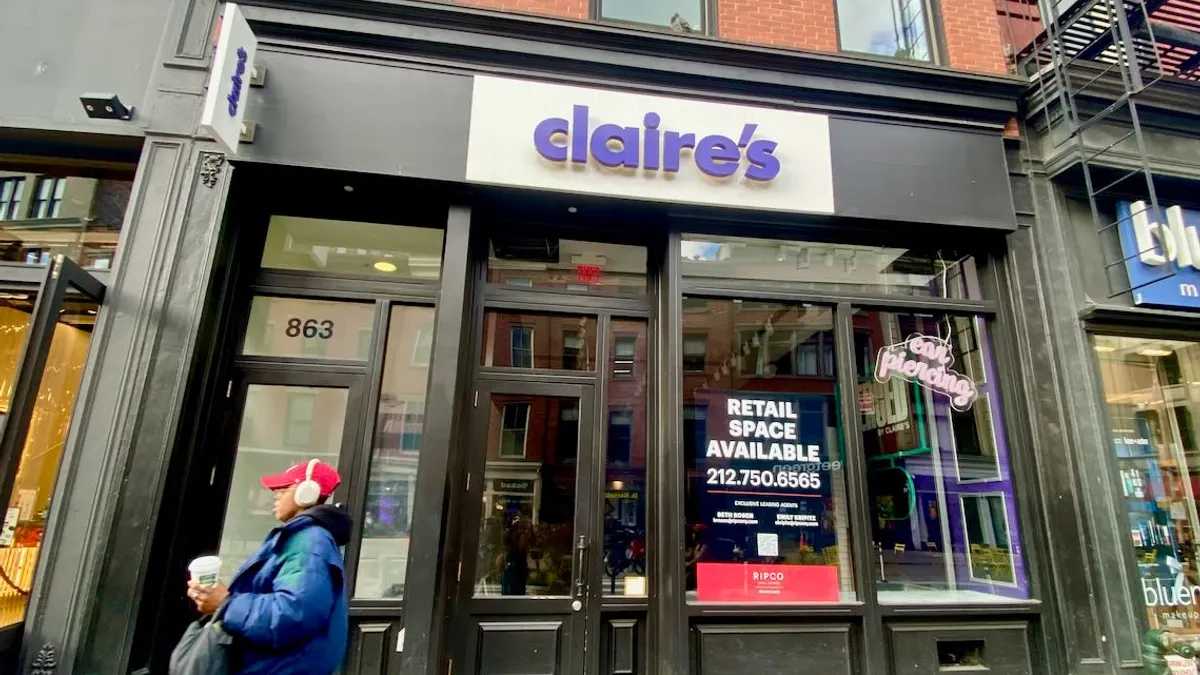Another brand has hopped on the Amazon bandwagon — and analysts still feel mixed about whether it's a death trap or a chariot to growth.
PVH-owned Calvin Klein Inc. and Amazon Fashion recently announced the Calvin Klein X Amazon Fashion holiday retail experience, available now through Dec. 31. The collaboration includes pop-up shops in New York City and Los Angeles, as well as an online brand store — My Calvins — on Amazon.com. The shops will host special events with celebrities, including supermodel and entrepreneur Karlie Kloss, and comedian and author Lilly Singh.
At the limited-time pop-up shops, customization stations allow shoppers to personalize products with embroidery and shareable social media clips let customers interact with content in real time. Shoppers can take items home immediately, or scan a bar code in the Amazon app to have their items delivered to their home.
What's in it for Amazon? Well, fitting rooms feature Amazon Echo devices, allowing shoppers to ask Alexa questions about the Calvin Klein product and experience, control lighting features and play music of their choice. As Amazon pushes into brick-and-mortar retail, stores have become an important destination for customers to try out its devices. In early November, Amazon announced it would expand the sale of these devices in Whole Foods stores, bringing pop-up shops to nearly 100 locations.
Alexa-enabled devices are also sold at 13 Amazon bookstores around the country, as well as at shop-in-shops at Kohl's stores. Calvin Klein is hardly the first brand to tie the knot with Amazon. Earlier this year, Nike made waves when it announced it would sell directly on the e-commerce platform.
As Amazon reaches to new corners of brick-and-mortar retail through in-store partnerships, the discussion forum RetailWire asked its BrainTrust panel of retail experts the following questions:
- What significance does Calvin Klein’s exclusive deal have for Amazon, fashion brands and department stores?
- Should exclusives become a bigger part of Amazon’s fashion push?
Here are nine of the most provocative and insightful comments from that discussion. Comments have been edited by Retail Dive for length and clarity.
1. Getting in bed with the devil
Peter Messana, SVP Product, GroupBy: I think these decisions by suppliers are bad long-term decisions for the short-term pop they will get. It is like getting in bed with the devil — they are giving up on all other channels by pushing Amazon as the number one channel and this would kill off any [direct to consumer channel] they may have as well. If they went with only a small subset of products to grow the brand that would seem to be more effective and a good use case. I suppose if you don’t believe your brand is strong enough that people will seek it, then this is a fine idea but I would rather build a brand that people seek than a brand of convenience.
2. Amazon is the department store of the future
Phil Masiello, Founder and CEO, Hound Dog Digital Agency: This move sends a clear signal to department stores, that Amazon is far more important to a brand’s growth than traditional retail.
Brands, in general, are also a bigger part of Amazon’s growth push. Migrating away from an open marketplace with multiple sellers competing on price, to a more controlled marketplace selling brands is Amazon’s future. Hence the development of the improved Brand Registry.
Amazon is the department store of the future.
3. Department stores — blame yourselves
Neil Saunders, Managing Director, GlobalData: Department stores have only themselves to blame for this. They have long since lost their status as one of the primary channels through which consumers want to discover new and premium products. Calvin Klein’s decision is just part of the shift to brands seeking out more effective routes to market.
4. A trendy fit
Min-Jee Hwang, Director of Marketing, Wiser Solutions: This move is all about relevance. Both Calvin Klein and Amazon are trendy, so they are a natural pair. Could you see a department store doing this? Neither could I. Amazon stays fresh through constant experimentation and Calvin Klein is smart for signing on. The "cool" factor may sell more products and Amazon will learn a great deal from the brand that it can apply to its own fashion brands.
5. Taking a page from Target's playbook
Ben Ball, Senior Vice President, Dechert-Hampe: Exclusives are a great fit for Amazon. The "virtual shelf" provides the perfect operational environment for one-off and exclusive line promotion. The strategy also fits Amazon’s goal of being a mainline retailer. Just as Target leveraged exclusive designer lines to differentiate, so can Amazon.
6. An exclusive strategy
Kiri Masters, Founder and CEO, Bobsled Marketing: This marks the beginning of a totally new strategy for this Calvin Klein. Amazon wooed CK with some really interesting ideas, which may give an indication of Amazon’s future retailing model.
This shows Amazon is actually willing and able to pull out all the stops for brands that it really wants to work with. And Amazon wants exclusive products — it wants to have an edge with its assortment so that customers continue to want to shop on Amazon first.
Brands like CK are recognizing that their previous core customer (department stores) is dwindling, and they should just invest where customers want to shop – on Amazon. Brand discovery and engagement is still important though, hence the unique pop-up store.
7. 'Yawn'
Chuck Palmer, Principal Strategist, ConsumerX Retail: Amazon Fashion + Calvin Klein. Yawn.
This feels more like a desperation play for both. If Amazon is seeking fashion credibility, I’m not sure Calvin Klein is going to deliver that. This feels like PVH and Amazon convincing themselves this is a good idea; it seems like it is much more about marketing (by throwing mud against a wall to see what sticks) than it is about consumer relevance.
Regardless, the data will be assimilated and resistance is futile.
8. Testing the physical waters
Cate Trotter, Head of Trends, Insider Trends: I find the details of how the pop-ups work very interesting. The use of Alexa in fitting rooms to control lights and answer questions seems like a very cost-effective option for retailers to add this kind of functionality to their spaces.
For Calvin Klein it seems a good way of increasing visibility of the brand at a crucial spending time, but without putting too much product through Amazon — assuming that it doesn’t just drive customers to return to Amazon for their Calvin Klein purchases!
9. Be afraid, very afraid
Ken Morris, Principal, Boston Retail Partners: Fashion brands should be cautious, as what starts out with an exclusive product play may evolve to something much more than that. Amazon has disrupted other categories, such as electronics and department stores, and they have the power to do the same thing in fashion.
Amazon has already launched private label brands and now has exclusive premium brand apparel. If I were an apparel retailer, I would be very afraid…




















